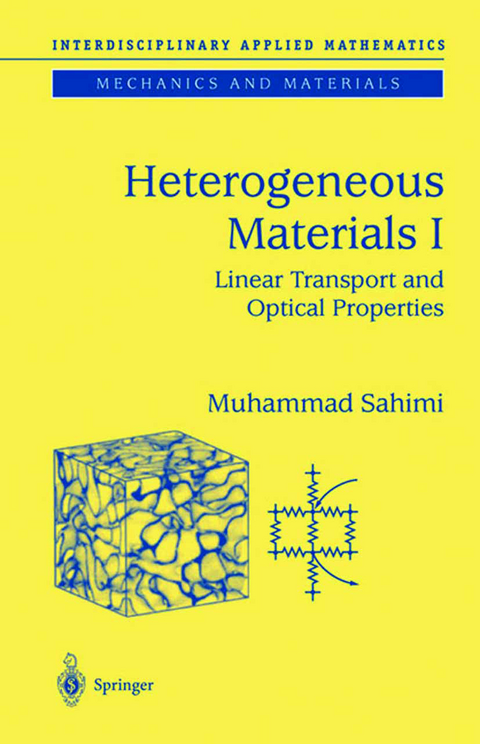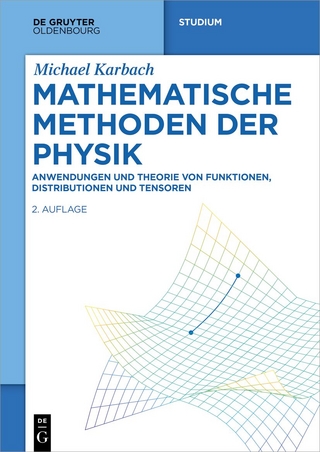
Heterogeneous Materials I
Linear Transport and Optical Properties
Seiten
2013
|
Softcover reprint of the original 1st ed. 2003
Springer-Verlag New York Inc.
978-1-4757-7851-9 (ISBN)
Springer-Verlag New York Inc.
978-1-4757-7851-9 (ISBN)
4 Derivation of Elastic Networks from Continuum Elasticity 8. 6 Rigidity Percolation 8. 5 Mapping between rigidity percolation and resistor networks 8. 6 Nature of phase transition in rigidity percolation 8. 8 The Critical Path Method 8. 11 Elastic Percolation Networks with Bond-Bending Forces 8.
8. Rigidity and Elastic Properties: The Discrete Approach 8. 0 Introduction 8. 1 Elastic Networks in Biological Materials 8. 2 Number of Elastic Moduli of a Lattice 8. 3 Numerical Simulation and Finite-Size Scaling 8. 4 Derivation of Elastic Networks from Continuum Elasticity 8. 4. 1 The Born model 8. 4. 2 Shortcomings of the Born model 8. 5 The Central-Force Network 8. 6 Rigidity Percolation 8. 6. 1 Static and dynamic rigidity and ?oppiness of networks 8. 6. 2 The correlation length of rigidity percolation 8. 6. 3 The force distribution 8. 6. 4 Determination of the percolation threshold 8. 6. 4. 1 Moments of the force distribution 8. 6. 4. 2 The pebble game 8. 6. 4. 3 Constraint-counting method 8. 6. 5 Mapping between rigidity percolation and resistor networks 8. 6. 6 Nature of phase transition in rigidity percolation 8. 6. 7 Scaling properties of the elastic moduli 8. 7 Green Function Formulation and Perturbation Expansion 8. 7. 1 E?ective-medium approximation 8. 7. 2 The Born model 8. 7. 3 Rigidity percolation 8. 8 The Critical Path Method 8. 9 Central-Force Networks at Non-zero Temperature and under Stress 8. 10 Shortcomings of the Central-Force Networks 8. 11 Elastic Percolation Networks with Bond-Bending Forces 8. 11. 1 The Kirkwood-Keating model xiv 8. 11. 2 The bond-bending model 8. 11. 3 The percolation thresholds 8. 11. 4 The force distribution 8. 11. 5 Comparison of the central-force and bond-bending networks 8. 11.
8. Rigidity and Elastic Properties: The Discrete Approach 8. 0 Introduction 8. 1 Elastic Networks in Biological Materials 8. 2 Number of Elastic Moduli of a Lattice 8. 3 Numerical Simulation and Finite-Size Scaling 8. 4 Derivation of Elastic Networks from Continuum Elasticity 8. 4. 1 The Born model 8. 4. 2 Shortcomings of the Born model 8. 5 The Central-Force Network 8. 6 Rigidity Percolation 8. 6. 1 Static and dynamic rigidity and ?oppiness of networks 8. 6. 2 The correlation length of rigidity percolation 8. 6. 3 The force distribution 8. 6. 4 Determination of the percolation threshold 8. 6. 4. 1 Moments of the force distribution 8. 6. 4. 2 The pebble game 8. 6. 4. 3 Constraint-counting method 8. 6. 5 Mapping between rigidity percolation and resistor networks 8. 6. 6 Nature of phase transition in rigidity percolation 8. 6. 7 Scaling properties of the elastic moduli 8. 7 Green Function Formulation and Perturbation Expansion 8. 7. 1 E?ective-medium approximation 8. 7. 2 The Born model 8. 7. 3 Rigidity percolation 8. 8 The Critical Path Method 8. 9 Central-Force Networks at Non-zero Temperature and under Stress 8. 10 Shortcomings of the Central-Force Networks 8. 11 Elastic Percolation Networks with Bond-Bending Forces 8. 11. 1 The Kirkwood-Keating model xiv 8. 11. 2 The bond-bending model 8. 11. 3 The percolation thresholds 8. 11. 4 The force distribution 8. 11. 5 Comparison of the central-force and bond-bending networks 8. 11.
Characterization and Modelling of the Morphology.- Characterization of Connectivity and Clustering.- Characterization and Modelling of the Morphology.- Linear Transport and Optical Properties.- Effective Conductivity, Dielectric Constant and Optical Properties: The Continuum Approach.- Effective Conductivity and Dielectric Constant: The Discrete Approach.- Frequency-Dependent Properties: The Discrete Approach.- Rigidity and Elastic Properties: The Continuum Approach.- Rigidity and Elastic Properties: The Discrete Approach.- Rigidity and Elastic Properties of Network Glasses, Prolymers, and Composite Solids: the Discrete Approach.
| Reihe/Serie | Interdisciplinary Applied Mathematics ; 22 |
|---|---|
| Zusatzinfo | XX, 692 p. |
| Verlagsort | New York, NY |
| Sprache | englisch |
| Maße | 155 x 235 mm |
| Themenwelt | Mathematik / Informatik ► Mathematik ► Angewandte Mathematik |
| Naturwissenschaften ► Chemie ► Physikalische Chemie | |
| Naturwissenschaften ► Physik / Astronomie ► Mechanik | |
| Naturwissenschaften ► Physik / Astronomie ► Thermodynamik | |
| Technik ► Maschinenbau | |
| ISBN-10 | 1-4757-7851-1 / 1475778511 |
| ISBN-13 | 978-1-4757-7851-9 / 9781475778519 |
| Zustand | Neuware |
| Haben Sie eine Frage zum Produkt? |
Mehr entdecken
aus dem Bereich
aus dem Bereich
Anwendungen und Theorie von Funktionen, Distributionen und Tensoren
Buch | Softcover (2023)
De Gruyter Oldenbourg (Verlag)
69,95 €
Buch | Hardcover (2024)
Hanser (Verlag)
39,99 €
Ausgewählte Kapitel für das Master-Studium
Buch | Hardcover (2024)
Carl Hanser (Verlag)
39,99 €


